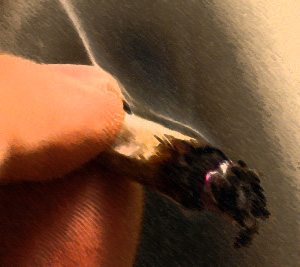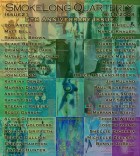As part of an outreach to new voices, editors on staff were encouraged to approach writers new to SmokeLong. Kelly Spitzer selected Murray Dunlap, and had this to say:
I first read Murray Dunlap’s work in Post Road Magazine, Issue 13. (http://www.postroadmag.com/13/ fiction/Dunlap.phtml) The name of the story was “Alabama,” and I was immediately drawn to the voice. Inexplicably (or not?) the piece radiated Southern charm. What does that even mean, you wonder? I’ve never been to the South, but to me, it simply indicates an easy likeability. Oh, the characters in “Alabama” aren’t perfect, and neither are the characters in “The Interpretation of Light.” But you get this sense that they are good people, nonetheless, people that you can hope for. At least those that make it out alive… Which is another aspect I like about Murray’s work. He’s not afraid to delve into the dark side.
As a writer whose work I appreciate, I’m excited and grateful to have this story included in this special issue of SmokeLong Quarterly. Thank you for trusting us with your work, Murray! I’d like to ask you now—which writers working in the flash form today do you admire? What about their work speaks to you?
You’re very welcome. And thank you, Kelly. Every time I place a story, I run out and eat a massive celebratory cheeseburger. Believe me, the pleasure is mine.
I have a clear memory of a flash fiction piece called “The Mesmerist” by Michael Knight that came out in Esquire many years ago. It was about a man who hypnotizes a girl and abducts her. Michael and I grew up together in Alabama and I have always been a fan of his work. But this tiny little piece of fiction, a single page, struck me differently. Somehow the one page format only enhanced the power of the abduction. The story worked on such a larger scale than the word count seemed to allow. So I went straight to the local bookstore and bought a flash fiction anthology.
About the same time, I was in a Hemingway phase and read all those vignettes between the In Our Time short stories. As a writer, I hadn’t developed much endurance yet, so the form was very appealing. Of course, I learned what we all eventually learn: shorter isn’t easier. I think Raymond Carver’s “The Father” is amazing. Donald Barthelme has several great ones. Lucy Corin has a tiny piece in one of the New Stories from the South anthologies called “Rich People.” I remember laughing about pâté for days after reading it. And if you want prolific, Kathy Fish has more flash fiction on the web than anyone I know of. The amazing thing is that it’s all good.
My own flashes often originate from ephemeral images too intriguing to let go of. How did “The Interpretation of Light” begin?
This kid I knew in high school was run over by a train and bled to death. Really. And it’s been a disturbing image in my head ever since. As a writer, I never had anything to connect it with. Then one day I was working on a story that contained an abortion and it clicked. The fragility of youth and the consequences of youthful decisions. So I stopped work on the other story and started this one. I imagined it would be a bigger, longer piece, but three hours later it was done. Sex, drugs, and death in less than 500 words. I’m still not sure how it all fits in there.
The title is beautiful. Is it meant to be?
I’m happy to hear that you find it beautiful. I was just trying to nudge the reader in the right direction. The best thing about the title was discovering the art that goes with it. I’ve been lucky enough to live down the street from an amazing sculptor, R.G. Brown, and when I told him about this story, he immediately pulled out a group of photographs he had taken at the Rose Hotel in Bangkok. His room had a huge pane of beaded glass instead of a traditional window or balcony. It was too warm in the room and the pane of glass wouldn’t open. R.G. fought with it for several minutes before noticing the incredible orb of light shining through. Then he pulled out his camera. Not one thing about the photo has been altered or digitally enhanced. Talk about an interpretation of light. Later, when he finally got the window open, R.G. discovered that this beautiful anomaly came from a single light bulb suspended by a cord over a construction site about fifty feet away.
His newest work involves burying constructed pieces of sculpture and then “seeing” the buried work through ground penetrating radar. The results of the radar scans become a new piece of art altogether. In many ways, he is studying memory and the interpretation of memory. Everything about his work screams metaphor. I aspire to accomplish this enviable feat in my fiction.
Will you tell us anything about the novel you’re working on?
It is an utter, utter mess.
But I’m hopeful. I wrote the first seventy pages and quit. Gave up. Worked on other things for a while. Then I restructured and rewrote everything. Then I gave up again. Recently I pulled it back out, read it, and decided that while it is, in fact, an utter, utter mess, it may be worth fighting for. I think I’m trying to get over personal loss through the writing of it. Trying to figure out how my brain should make those difficult pieces fit. Of course, another part of me wants to burn it and write a laugh-out-loud comedy. You never know.
This issue marks SmokeLong‘s fifth anniversary, which has me thinking about longevity and growth. There’s no denying the literary arena is a fickle one, with journals coming and going, writers shooting onto the scene then falling into a long hiatus, editors changing houses, agents merging, and the trends! Don’t even get me started! How do you, as a writer, endure the ups and downs? Have you experienced any setbacks? What measures have you taken to grow?
I can’t begin to answer this question with a straight face. Any setbacks! Of course. The writing life is a stunningly difficult one. Rejection, rejection, rejection. I once spent eight months rewriting my collection for an editor who then said, “This isn’t really what I had in mind. If you ever write a novel, give me a call.” About every other day I flew into a rage and announced, “I fucking quit!” at the top of my lungs. Then I’d wake up the next morning and start a new story. I think for some of us, you have no choice. If the bug is in you, it’s in you. These days I’m getting better at accepting that fact and trying to be a little more Zen about it. The writing, the publishing, and the need to make a living are three entirely separate things. I’d say this has been the hardest lesson for me to learn. But if I’m in it for the long haul, and I think—for better or worse—I am, then it may be the one thing that saves me from giving it all up.
But I should add to that. I think distance running has kept me going. Long hikes with our dogs. Cheap beer, expensive scotch, and whatever wine is within reach. Most of all, a perfectly amazing wife who has the patience to put up with a fool like me. You can’t just be a writer. It’s too hard. You’ve got to be a writer with distractions and safety nets. You’ve got to have a support system as long as a river. You’ve got to know that there is no end to the struggle and that the struggle is the thing itself.
That’s where I am with this writing life. It’s not so bad.



 The core workshop of SmokeLong Fitness is all in writing, so you can take part from anywhere at anytime. We are excited about creating a supportive, consistent and structured environment for flash writers to work on their craft in a community. We are thrilled and proud to say that our workshop participants have won, placed, or been listed in every major flash competition. Community works.
The core workshop of SmokeLong Fitness is all in writing, so you can take part from anywhere at anytime. We are excited about creating a supportive, consistent and structured environment for flash writers to work on their craft in a community. We are thrilled and proud to say that our workshop participants have won, placed, or been listed in every major flash competition. Community works.